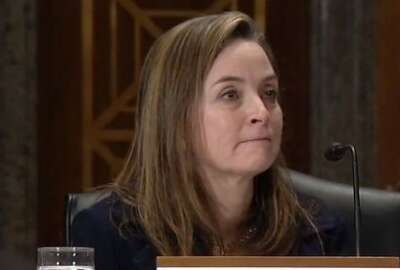Tom Temin: Miss Kent, good to have you on.
Evelyn Kent: Thank you. It’s good to be here this morning.
Tom Temin: And just for purposes of kind of setting the context here, tell us about the office you work in at the research and engineering office in the Pentagon where that all sits in the in the grand scheme of things.
Evelyn Kent: Thank you. I work in the Office of the Director of Defense Research and Engineering for Research and Technology, and that office is responsible for DoD research and technology portfolios, from basic science to advanced technology development. Our organization ensures that the Department of Defense is postured to develop the next generation of disruptive and engineering technologies and enable the rapid delivery of superior capabilities to the warfighter.
Tom Temin: So you have established, or will be establishing, with some pretty decent size investments centers of excellence at these two institutions. Tell us what a center of excellence is in this context and what will happen there.
Evelyn Kent: Okay, so our centers of excellence are each focused on our DoD modernization priorities. However, there is a generic description that can be used in regards to our centers of excellence. We define our centers of excellence as, they provide leadership research, education, and best practices for a specific focus area. As you have already indicated, our focus area for Howard University is artificial intelligence machine learning. And our focus area for Delaware State University is advanced quantum sensing. And both of those focus areas aligned with the Department of Defense modernization priorities.
Tom Temin: All right, and students will be involved here too, correct?
Evelyn Kent: That is correct. Our students and the faculties will be involved in our centers of excellence. Each center of excellence, they have a program, our project director that’s aligned with our modernization priorities. And we have anywhere from 10 to 20 students directly impacted and involved in our centers of excellence. These students will be hands-on research at those centers. They will also be provided opportunities to serve and to work in our defense laboratories in the summertime through internship programs. That is a 10-week program.
Tom Temin: Wow. And are these centers of excellence physical places? Will there be established rooms and physical facilities?
Evelyn Kent: Yes, this summer, however, we are still virtual due to COVID-19. But in our other centers that were established before the ones at Howard University and Delaware State University, they were in-person throughout the country, and focused at our Army, our Navy, and our Air Force research laboratories. As well as our new partner in the Department of Defense, it is titled CAPE, our Cost Analysis Program Evaluation Office that resides in the Office of Secretary of Defense, also are involved in our internship program, and are focused on, as well, the DoD modernization priorities.
Tom Temin: Because when you talk about advanced quantum sensing, that’s the one of Delaware State, and artificial intelligence and machine learning at Howard, then that takes some specialized gear at some point, correct?
Evelyn Kent: That is correct. For example, the center at Howard University will focus on developing and evaluating trustworthy, reliable, and robust machine learning — algorithms — and artificial intelligence systems for our mission critical application. And the goal here is to make sure that as we develop these centers of excellence, they establish and maintain partnerships, not only with the government, but with industry. Because as DoD makes these investments in the centers of excellence, we want to make sure we sustain these centers of excellence, and as I said earlier, our priority is to make sure we provide the superior capabilities to our warfighter. So we want to make sure that as we develop these centers of excellence, there are applications coming out of these centers that can do just that. Focus on our warfighter.
Tom Temin: We’re speaking with Evelyn Kent, she’s program director for science at historically black and minority serving institutions at the Defense Department. And how is the research agenda set? Because you don’t want to have duplication of efforts say with what contractors might be doing, with what the labs within DoD might be doing. So, how do you coordinate all that and make sure that they’re doing original work at the centers of excellence at these colleges?
Evelyn Kent: Well, what we have are subject matter experts in the Department of Defense that service our technical managers. For the centers, they are our principal directors in our research and engineering, and each one of those directors, there are 12 of them. And they are aligned with our modernization priorities. So what we do is we work with them, and we develop those research topics and research priorities, but the competition of […] to compete, which, as you’re aware, these modernization priorities, not only for the Department of Defense, but all federal agencies, artificial intelligence, biotechnology, autonomy, cyber, all of them are very focused. However, what we do is we develop specific goals within each of those centers, working with those principal directors, to ensure that we produce the knowledge and understanding of the emergency science and technologies that these centers will focus on to support the Department of Defense mission.
Tom Temin: And what’s your hope for the students that come through these centers of excellence?
Evelyn Kent: Well, I hope for these students is they can get to know DoDs mission. And I hope for these students also, at historically black colleges and universities, and minority serving institutions, is to let them see and understand how both the military, and the civilians and contractors, how we all work together. Because having worked this program for some time, many of the HBCUs, historically black colleges and universities, tend to think we’re just a uniform organization. That is our number one priority. However, to support that warfighter, we have civilian and contractors. So when those students come in, and they began to get involved with the research throughout the department, they get hands on experience working with all of them, our military, our civilian, and our contractors. And it develops their skills in the science, technology, engineering, and mathematics areas. And these students are able to apply for our internship programs, as I said out at our defense laboratories. They’re also able to get a network to establish a network of contacts within the Department of Defense. And as you’re aware, the young people now really love the networking, and building those lasting relationships. So we want to make sure they build those lasting relationships through those centers of excellence that would benefit the Department of Defense, that would benefit the center faculty at their university, and also benefit the students
Tom Temin: And are these up and running yet or this is something that’s going to happen? What’s the status so far of the program?
Evelyn Kent: They are up and running. We launched the Howard University Center of Excellence in Artificial Intelligence and Machine Learning on January 28, 2021. And we launch the Delaware State University on March 2, 2021.
Tom Temin: Evelyn Kent is program director for science at historically black and minority serving institutions from the Defense Department. Thanks so much for joining me.
Evelyn Kent: Thank you for having us.





